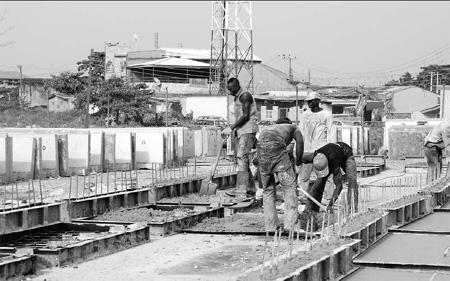Sino contractors also dredging a port and building a student dorm
Lagos, Nigeria - Driving on poor roads jammed with traffic through Lagos, Nigeria's largest city and its economic heart, can be one of the most demanding jobs in the world - so Yemi, a local driver, has to keep a quick eye on the street and a steady hand on the wheel.
 Nigerian workers make pipes for a drainage system. Ma Chao / China Daily
Nigerian workers make pipes for a drainage system. Ma Chao / China Daily "You can never predict what might happen," said the 35-year-old and father of two who has been making his way though logjams in the city for 16 years.

But his days of slogging may soon end, as a group of Chinese construction workers are improving the city's road system, particularly in Mushin, an impoverished area with many slums in the part of town where Yemi is originally from.
The renovation project - 16 urban roads covering 10.5 kilometers - is one of four being undertaken by China Gezhouba Group Corporation.
The company is also working on port dredging projects in Lagos and in Niger state in western Nigeria, as well as the construction of a dorm for the National Defense College in Abuja, the capital city.
The project in Mushin started in December, and Yemi has joined the Chinese workers as a driver for the project.
Resettlement was a big obstacle facing the project in Mushin. Since several roads are being widened, shops and homes by the roadside had to be demolished. In an area with a dense population and a lot of slums, it was not easy work.
"To make the demolition smooth, sometimes we have to ask the local chiefs to persuade the residents to move. And the compensation for demolition is naturally quite high," said He Zhiming, project manager of the road renovation project.
A factory producing material for the project has been built, demolition is almost finished and construction of a drainage system under several roads has started.
In the factory, dozens of workers are making pipes for the drainage system. Concrete is poured into molds and strengthened by rebar. With the drainage system in the area currently uncovered, dirty water runs along the ditches beside the roads.
The local government seems to be satisfied with the progress. Aderonke Bello, council manager of the Mushin district, said the company had delivered "good quality".
"When the project finishes, the traffic will be much better," she said.
The project employs 35 Chinese and more than 80 Nigerian workers. Chinese engineers are training the Nigerian employees to manufacture the materials and parts for the construction, turning unskilled laborers into skilled workers.
"The Nigerians can be hard-working if offered proper training and management," said He. The construction workers and the drivers earn an average local wage of 30,000 Nigerian naira (more than $200) per month, while the Nigerian engineers employed by the project get salaries from 100,000 to 200,000 naira per month.
China Gezhouba Group Corporation is not the only Chinese company undertaking construction projects in Nigeria, nor the biggest.
Chinese investment in Nigeria has been rising in recent years, said Rong Yansong, economic and commercial counselor of the Chinese Embassy in Nigeria.
China Civil Engineering Construction Corporation, which entered Nigeria's construction market in 1980s, is the biggest Chinese construction company in Nigeria.
It now has 56 projects underway across the country, including road and railway construction. The company's total investment has surpassed $10 billion and it employs more than 10,000 local workers.
"We provide hands-on training to the workers, helping Nigeria build up its workforce," said Ge Peng, a China Civil Engineering Construction Corporation manager in Nigeria.
The projects aim to upgrade the country's unstable power supply and run-down roads, which shackle a booming economy and the nation's development.
The government intends to encourage foreign companies, including Chinese, to help the construction. Martin Uhomoibhi, permanent secretary of the Nigerian Ministry of Foreign Affairs, appreciated the contributions the Chinese companies make in Nigeria and said more companies were welcome.
The general public in Nigeria has a very positive image of China. According to the latest Pew Global Attitude Project, 85 percent of Nigerians viewed China favorably last year, up from 79 percent in 2008, the highest among all 24 foreign countries surveyed. In a similar survey conducted by the BBC and released in April, 73 percent of Nigerians had a positive view of China.
Yemi seems to get along with his Chinese colleagues, too.
"Mr. He is a good man, and he treats me well," Yemi said.
When talking about China, he becomes very excited and cannot conceal his desire to visit the country.
"I have a friend who has been to Guangzhou. One day I'll go there and see it," he said.
China Daily





